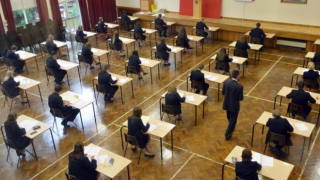The bigger issues behind scrapping A levels
I am as anxious as the next person that as many kids as possible (and not just the posh ones) should get a chance to study at school the subjects that AQA examining board has announced it is scrapping, including Art History, Classical Civilization and Archaeology (all, I think, with a small or very small enrollment). Neither Art History nor Archaeology are offered by other boards, so that is "Scrapping" with a capital S. Classical Civilization is also offered by OCR, so there is less cause for concern on that (I have never been much of a fan of "competition" in exam syllabuses, but I agree that all your eggs in one basket may not be a great idea).
But quite a lot of the handwringing seems to me to miss some bigger points. And interestingly, there has been virtually none for most of the other subjects being scrapped, that are not so close to the heart of the chattering classes. I am not sure that I myself shed a tear for the demise of Citizenship Studies A level, or Science in Society, and I dont know enough about them to comment (but I am sure they have their supporters, and maybe those without the hotline to newspaper desks).
And what are those bigger issues? Well first, one of the reasons given by AQA in the case of Art History and Archaeology has much wider implications: it boiled down to not being able to find the examiners. Waldemar Januszczak missed the point I think when he tried to squash that one by writing (subscription only):
"There are enough experienced art historians living within a couple of miles of me in north London to mark the nation���s art history papers 10 times over!"
Marking school exams requires additional skills beyond expert knowledge; ther fact that you can curate a Leonardo exhibition doesn't mean you can assess the nation's young -- and I wonder how many would want to do it anyway. It's a relatively low paid and relatively thankless task. The benefit for most teachers who take it on is that they get an inside view of the system they are preparing their pupils for.
But, that apart, this is surely weasel words from AQA. Part of the problem of our current assessment system is that it really doesnt have enough markers across the board to deal expertly with the millions and millions of scripts that are written each year. Art History is only the tip of an iceberg, and ought (if the AQA claims are anything like true) have been a wake up call to look at the relationship between expertise and the burden of examining more generally.
There are however even bigger question about the "fit" between what we teach, what young people learn and what we test them on.
One of the developments of the last thirty years or so is that with a few exceptions (like sex education) we assume that the whole of the school curriculum will be examined; if there is no exam on it, then it is not taught (and I can confidentally predict a compulsory test on sex, personal relations and consent before too long). Maybe we should be prepared to think of a school curriculum that contained fewer examinable subjects, and more that was taught that wasnt tested by national exams?
And may be we should look at the definition of some of these examinable subjects. How about a history syllabus that included special options in art history or archaeology? Maybe too we should think harder about the relationship of school subjects and university subjects. Back in the day (sorry to sound old and nostalgic) there would have been no possibility that universities would be looking for Art History A level from those wanting to read Art History (because there wasnt an Art History A level -- it's a relatively new invention). Even now, no one imagines that potential doctors or lawyers will have done Human Biology (another AQA casualty) or "Law". In fact medical courses are keener on Physics etc. Why do we invest so much in the beaten track from A level to degree.
The important issue here is how we let as many children as possible experience and get enthused by a range of subjects, examined or not. Blaming AQA for what, I am prepared to admit may have been a short-sighted decision, just reveal how enthralled we have all become to that link between between teaching and public testing.
That is what we should be challenging.
Mary Beard's Blog
- Mary Beard's profile
- 4104 followers




